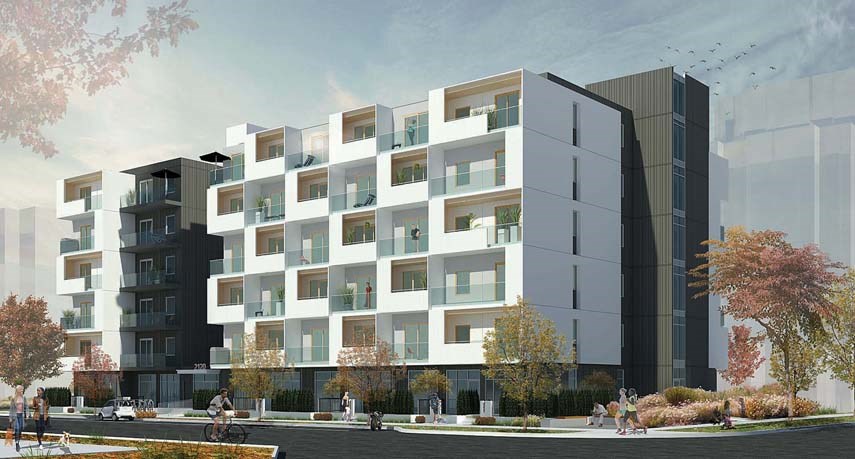A North Â鶹´«Ă˝Ół»developer is floating an idea to re-house people demovicted by a residential redevelopment.
In 2015, Darwin Properties bought Maplewood Gardens, a 1972 50-unit townhouse complex on Old Dollarton Road, with plans to redevelop it. The plan for 372 condos, 79 rental suites and 58-below market units is compliant with the Maplewood Area Plan but it hasn’t yet been to council for rezoning.
The company is now seeking a temporary use permit that would allow it to fast-track the affordable units so none of the current residents at the townhouse complex are forced out of the community.
“There is quite literally nowhere on the North Shore for these people to move to,” said Oliver Webb, Darwin president. “I’ve lived on the North Shore my whole life and I don’t necessarily like the direction we’re going. One hundred and sixty people call Maplewood Gardens home and have lived there for over 20 years. Our proposal has been to construct a modular rental building that allows those people who currently live at Maplewood Gardens to keep their kids in local schools and shop at local grocery stores while we build them a home.”
If the temporary use permit and the larger rezoning are approved, the six-storey, 99-unit building at the corner of Front Street and Riverside Drive could be move-in ready in 12 months, Webbe said, compared to 18 to 24 months for a traditional wood building.
Webbe said Darwin is designing the modular building to meet the needs of the current Maplewood Gardens residents. The new units would lease from $1,200 for a one-bedroom up to $2,100 for three bedrooms - about 70 per cent of the current market rates. The remaining 41 units would be purpose-built rental offered at market rates.
Only after the Maplewood Gardens residents were moved into their new homes less than a block away would Darwin demolish and redevelop the older complex, which is nearing the end of its useful life, Webbe said.
Typically, temporary use permits are valid for up to six years, but Webbe said he would immediately apply to make zoning for non-market housing permanent.
Although they’re called temporary modular, the units are built to last about 60 years, Webbe added. “No different than any wood-frame building we build today,” he said. “The quality of these units is often better even than framing it on site.”
Demovictions have been a hot-button issues in the civic election with a number of candidates pledging to vote against projects that put renters on the street. Webbe said he is hopeful this proposal will be seen as a “different approach” for development going forward.
“I’ve met with almost all of the candidates that are running for election, and what I’m hearing from all of them, which I like, is that they think there is an issue with housing affordability and what we’ve been building isn’t the right type of housing,” he said.



